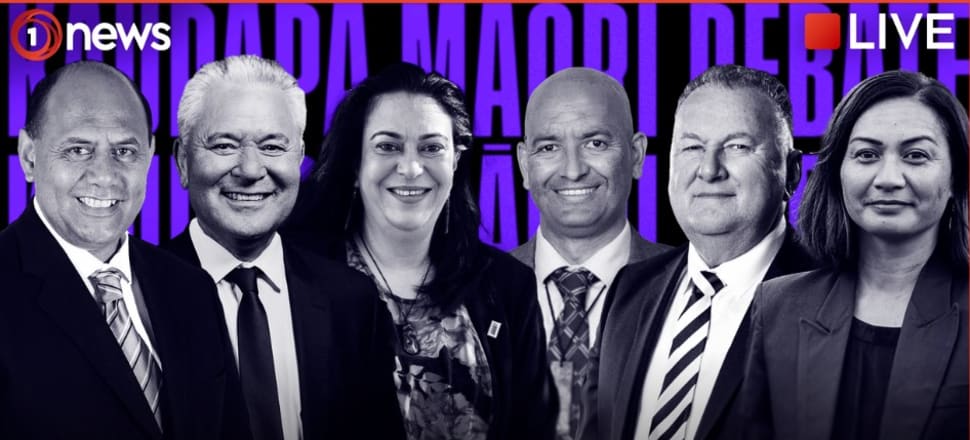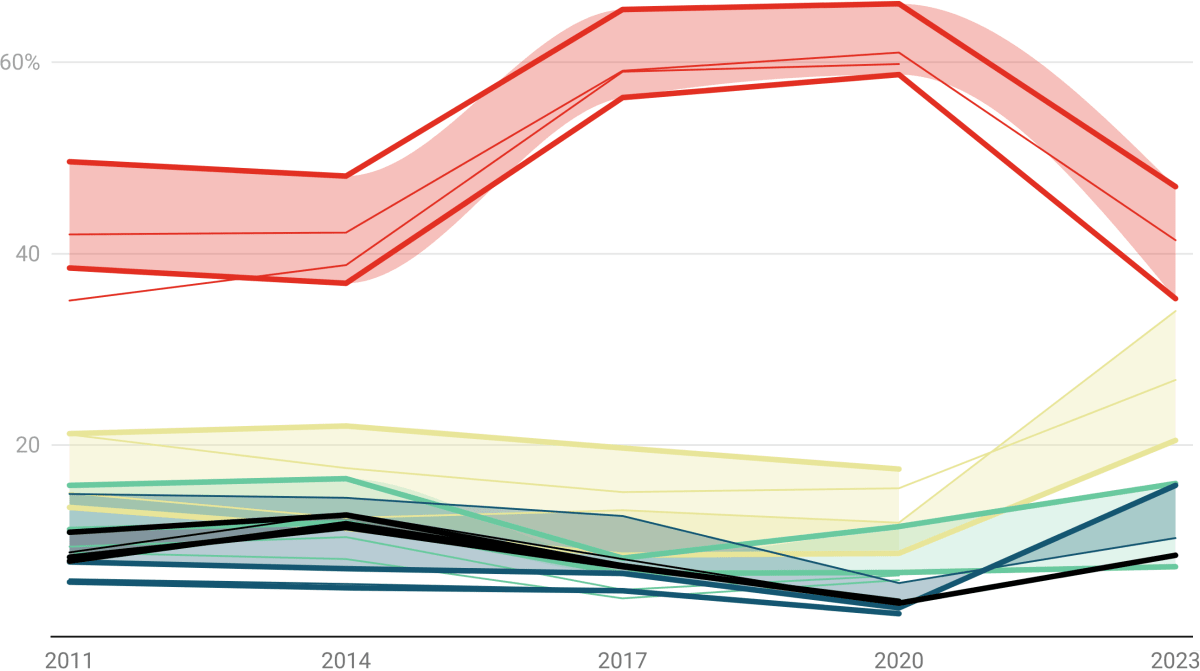
Aaron Smale tuned in to TVNZ’s Kaupapa Māori Debate which heard from Māori from each of the main parties. He didn't find a lot to get excited about.
Comment: It was a shambles but it was also telling. None of the political parties seem to have any coherent vision about where Māori fit into New Zealand society or where we’re going as a country, even as Māori will be a growing percentage of the population.
Instead, they put forward a half-baked version of their party’s definition of what Māori are or can be and no substantial solutions to the basic challenges facing not only Māori but an increasing number of Pākehā. But then that's fairly indicative of the whole political conversation right now.
Yes, it was a TV spectacle and that in itself precludes any detailed or nuanced discussion. But TVNZ’s Māori leaders' debate – Willie Jackson (Labour), Karen Chhour (ACT), John Tamihere (Te Pāti Māori), Tama Potaka (National), Marama Davidson (Greens) and Shane Jones (NZ First) – ricocheted from one hot button topic to the next without throwing much light on any of them.
READ MORE: * Te Pāti Māori's path to Parliament narrows * The race to represent a battered region
Moderator Maiki Sherman sometimes lost the thread and didn’t always pin down particular candidates on slogans used by parties like National, ACT and NZ First to juice up their poll figures, or press for a clear articulation of what Labour actually meant by co-governance or why they binned the term in election year. Most came out relatively unscathed but overall it felt uninspiring.
Tama Potaka looked like a character from the 70s TV show the Thunderbirds and spoke with all the charisma of one. When asked a question he immediately started regurgitating National’s talking points like a series of fur-balls, even though they bore no relation to the actual question.
When it was pointed out that National’s tax cuts would give someone on the lower end about $4 in their pocket and quizzed on what would this buy, he made a remark about buying a couple of protein bars and a lot of rice. It was so tone deaf you could hear the gasps in the audience. He isn’t interacting meaningfully with those turning up at food banks. And the panel discussions from commentators at the end wondered aloud about where he was buying his protein bars.
When a (rather vague) question was raised about gangs and crime, for some reason Potaka managed to stay completely silent as everyone else piled in and Sherman didn't to put the question to him. Which was a major failure, as National has been hammering this subject for some time.
Party vote trends in key Māori electorates

The Act Party’s Karen Chhour tried to sound sensible and reasonable but ended up putting forward various statements that represented inadvertent hypocrisy on her leader's behalf.
She politely complained that it wasn’t fair to be picking on someone who wasn’t in the room – David Seymour – when he wasn’t there to defend himself. That was rich. Seymour regularly stands in rooms full of Pākehā, mostly of an older generation, and puts the boot into Māori.
Act’s billboards usually have a line about ending racial division, while he is creating racial division to win votes. But when I requested an interview with him to talk about his statements on Māori, he wouldn't front. If Seymour's positions are the party's positions then it was Chhour's job to defend and promote them.
At times she floundered with her answers or she simply said she didn’t know, which is at least honest you could argue. But she made the remark that some Māori leaders seemed to suggest that if you weren’t on board with their view of what being Māori meant, then you somehow weren’t quite the same level of Māori.
The panel discussion at the end dissed her for her ignorance on certain issues – which was probably a fair call. But the panelists also failed to understand that maybe Chhour’s experience of being Māori is going through state care because of what was happening in her family, which has perhaps left her disconnected and still putting together what her identity is that was lost in that process.
Politics might be her way of doing that, but her difficult personal journey shouldn't be interpreted as a political shortcoming. The panel, who were all confident in their identity, almost confirmed her very point. Their experience is a privileged one but they looked down on her for lacking that privilege.
Willie Jackson was Willie Jackson, which meant he rattled on about how much Labour had done. Which, given they’ve had an absolute majority for the past three years, hasn’t been much of note. One of the few major bills they passed on their own was the Oranga Tamariki Oversight Bill, where they reduced the oversight of Oranga Tamariki, virtually dismantled the Childrens' Commission and ignored the Royal Commission's recommendations on oversight. Talk about kindness.
Jackson carried on about how Labour had a wonderful strategy for climate change when in the past month the Commissioner for the Environment said the government hasn’t developed a clear strategy for climate change and had done a poor job of consulting with Māori. Ditto the Climate Commission. But he deploys the tactic that if you sound convincing no one will notice what you’re saying.
Marama Davidson was sometimes too polite and didn’t get many chances to put across her views. When she did, she spoke clearly to the causes of many of the problems that others only touched on or avoided altogether. But then she had to try and jam her solutions into a soundbite before she got cut off.
Shane Jones sounded like he was being interviewed on Newstlk ZB rather than articulating how NZ First was going to address some of the major issues facing Māori. Probably because the demographic he and Winston Peters are banking on are old white people who listen to ZB and the only concern they have about Māori is that they should be put in their place, ie. the bottom. Jones was on his high horse about consequences for crime and said gangs are not whānau.
Well for some of us they are, whether we like it or not. And they also have whānau. He huffed and puffed that if they didn't change their ways then they didn't belong in our community. Which kind-of misses the point that they might not have actually ever belonged in any functional community in the first place or that they were ripped out of the one they knew, which is why they ended up in gangs.
Fortunately, Marama Davidson put her finger on this very point – that many of those in prison and gangs were first harmed by the violence and abuse of the state when they were children. “Where is the responsibility for that harm?” she asked as she turned to Shane Jones, who sniffed in disdain.
The topic of housing - probably the single biggest ticket item when it comes to the cost of living - generated a competition for how many houses their party could build while avoiding the obvious problem, which is that prices are out of whack with income.
There was no discussion on how rampant house prices have been partly created by lax governance of the banking and tax systems by both major parties over a sustained period of time. But then no parties are really discussing that, because that might upset the capital gains of Pākehā homeowners. The structural issues around this were simply not even raised, let alone addressed.
The discussion of co-governance created a lot of noise but not a lot of enlightenment. No one could really define what it meant - or even where the term came from - only that it was either good or bad. Chhour at times put forward the usual neoliberal devolution (ie. privatisation) argument which inadvertently put her in line with both John Tamihere and Willie Jackson sitting either side of her. But that wasn’t co-governance, it was something else. Again, everyone was disagreeing with what they told voters someone else was saying.
Tamihere took well-aimed pot-shots at all and sundry and showed his chops as a radio talkback host by getting in short, sharp jabs and then stepping back. He repeatedly touted that Te Pāti Māori was the only party that was advocating wholeheartedly for Māori without being constrained by Pākehā expectations, but it would have been interesting to hear him elaborate on what Te Pāti Māori policies meant for Aotearoa as a whole.
One of the few strong moments was when both Willie Jackson and JT lost their script and talked in personal tones about the challenges of getting young Māori off the well-worn paths to prison and how that needed a whole lot of attention to a number of issues.
There wasn’t anything they said that stood out. It was just that how they said it indicated they had actually dealt with the human beings they were talking about. It was a moment when it felt like the debate wasn’t just about abstractions.
Some of the most articulate moments were actually comments from Māori on the street whose views were interspersed throughout the debate. But more often than not there seemed to be a disconnect between the reality that they described and the political offerings of those who want to represent them in Parliament. Or purport to, at least.
Because as panelist Ngarimu Blair said at the end, this was Pākehā politics. There was a vague sense throughout the debate that the candidates, even Tamihere, were playing a double game – while supposedly appealing to Māori they were constantly calibrating their statements either to not alienate Pākehā or to play the useful, funny, safe, or non-threatening Māori to Pākehā listeners. Or to at least avoid landing themselves in the headlines for the wrong reason.
Pākehā politicians don't have the same kind of burden or the need to constantly make those sorts of fine calculations. Instead, Pākehā political leaders seem to believe they can either ignore Māori or use them as a wedge issue to exploit (some Pākehā media are quite happy to play the same game). This election may show if that tactic has still got currency. Unfortunately, going by some polls that dollar is trading rather high at the moment.







